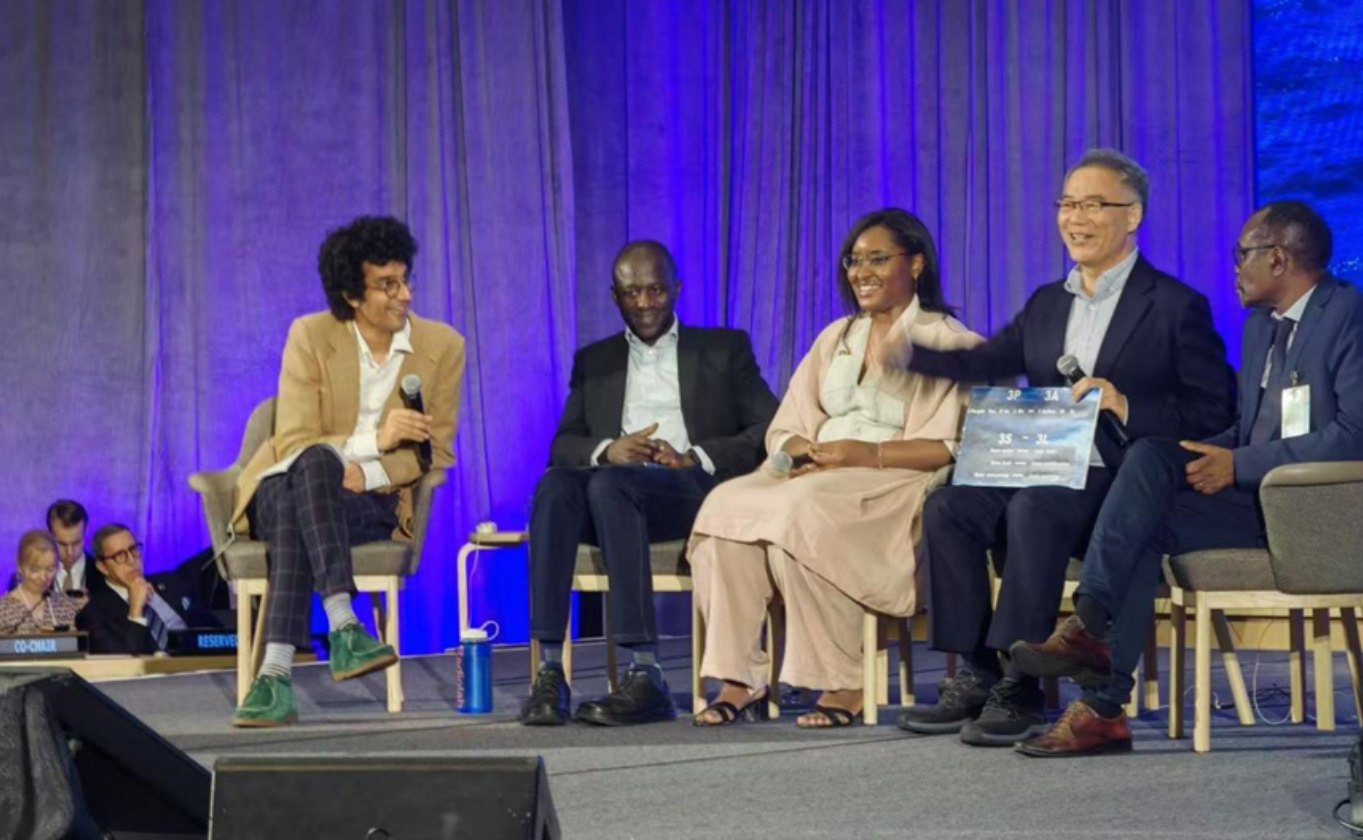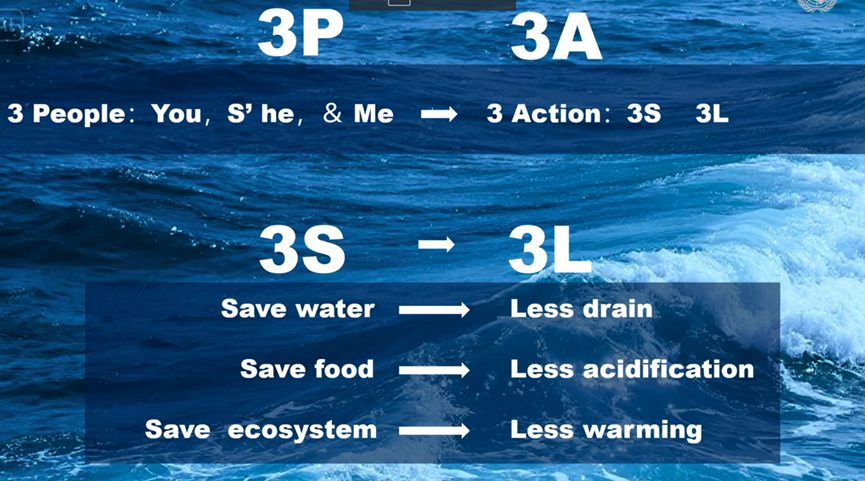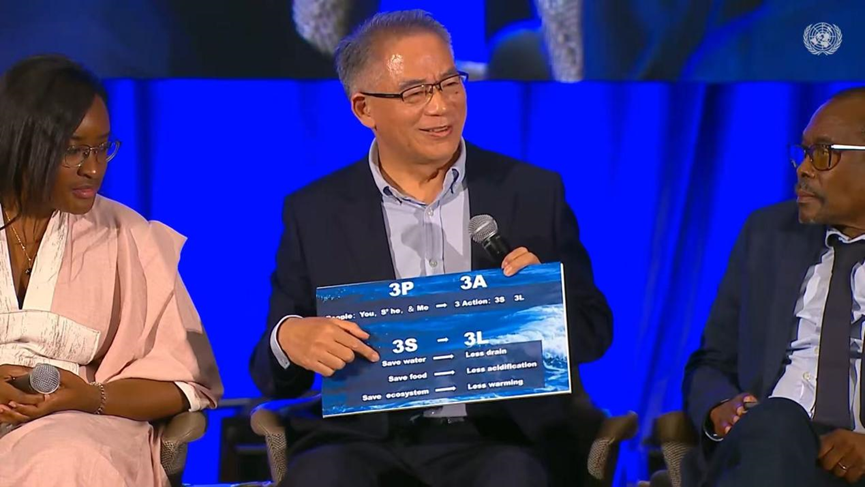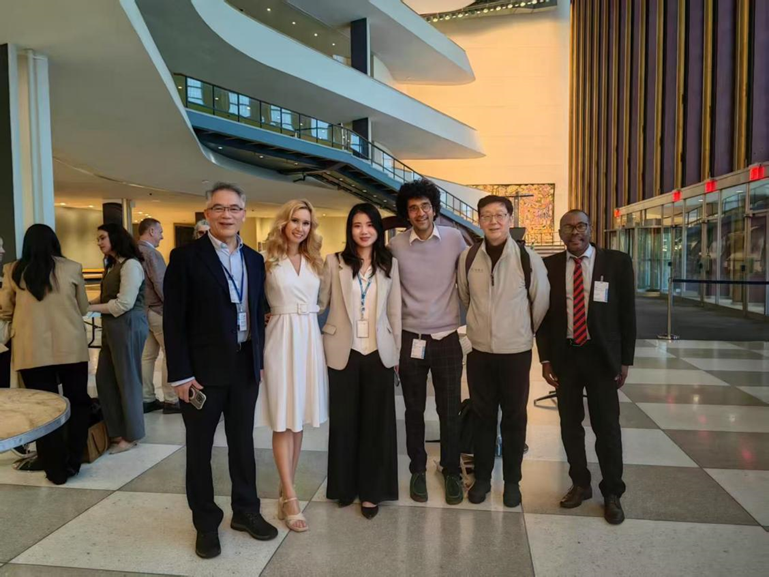10th Multi-stakeholder Forum on Science, Technology and Innovation for the Sustainable Development Goals (STI Forum) was held at the United Nations Headquarters in New York from May 7 to 8, 2025. The third thematic session of this year’s STI Forum focused on “Leveraging science to conserve, restore and sustainably use the ocean and coastal ecosystems”. Research led by Nianzhi Jiao, Academician of Chinese Academy of Sciences, Chief Scientist of Ocean Negative Carbon Emissions (ONCE) mega science program, on “The Microbial Carbon Pump (MCP) and Climate Change,” published in Nature Reviews Microbiology in 2024, has attracted significant international academic attention and became one of the highlights of this year’s forum. The organizers invited Academician Jiao to deliver an in-person presentation on the theory, methodology, and application prospects of MCP.
At the invitation of the session moderator, Academician Jiao provided a clear and engaging introduction to the concept, significance, and development of MCP, emphasizing its critical role in climate regulation. He highlighted the collaborative BCMS carbon sequestration mechanism, which integrates the biological carbon pump (BCP), carbonate counter pump (CCP), microbial carbon pump (MCP), and solubility carbon pump (SCP), aiming to maximize oceanic carbon storage and ensure sustainable ecosystem development. He also presented ONCE’s practical and science-based solutions, including “land-sea integrated approaches to emissions reduction and carbon sequestration enhancement,” “mariculture as a dual solution for food security and negative carbon emissions,” and “wastewater treatment coupled with microbial ecological engineering and effluent alkalinization.”

Academician Jiao pointed out that human activities have imposed environmental stress on marine ecosystems and exacerbated climate change. Some of these impacts, he noted, can be corrected through scientific understanding. He emphasized that the well-known process of ocean acidification refers to the drop in seawater pH from 8.2 (pre-Industrial Revolution) to 8.0–8.1 over more than a century. In contrast, today’s effluent discharge standards for pH at wastewater treatment plants around the world are often set at pH 6 or even lower, which significantly accelerates nearshore acidification and cause to coastal ecosystem degradation. “A pH drop of just 2 units translates to an approximately 150-fold increase in hydrogen ion concentration, posing a severe threat to marine organisms’ physiology and biodiversity,” Jiao explained. He urged governments to revise effluent discharge standards based on scientific understanding, raising the current pH lower limit from 6 to 8 to align with natural seawater pH.

During the representative statements session, Minister-Counsellor Ling Shi, China’s Science and Technology Representative to the United Nations, outlined China’s active scientific contributions to global issues such as earth evolution and climate change. The ONCE initiative, spearheaded by Academician Jiao, was highlighted as a prime example of China's commitment to international science cooperation and global public science initiatives.

Academician Jiao extended a warmly invitation to scientists worldwide to join the Global ONCE, which spans multiple domains including science, economics, technology, policy-making, and science education. In the field of scientific literacy and public education, Jiao has led the launch of a general education course titled Habitable Earth, co-taught by renowned international experts. The course covers a wide range of topics including the origin of the earth, ocean evolution, and the current and future state of the earth’s environment, and has been well received by audiences at all levels. With the support of AI technology, the course is currently being translated into 30 languages, covering the world’s major languages, promoting ONCE’s science communication and ocean literacy education globally.
In the concluding session, Academician Jiao called for strengthened alignment between science and policy and put technological innovation into practical application. He stressed that everyone can take part in efforts to protect ecosystems and address climate change. To that end, he introduced a memorable and easy-to-understand slogan: “3P–3A, 3S–3L”.

The “3P” symbolizes shared responsibility among all individuals--“you, s’he, and me”. The “3A” represents three concrete actions: through the “3S” of saving water, saving food, and saving ecosystems, we achieve the “3L” of less drain, less acidification, and less warming. Specifically, by conserving water and reducing wastewater discharge, and by raising the pH standards of effluent discharge, nearshore acidification and pollution can be mitigated; by reducing food waste, CO₂ emissions from organic matter decomposition are lowered, addressing ocean acidification at its source; and by protecting marine ecosystems and enhancing their carbon sink capacity, we contribute to alleviating global warming.

Jiao’s appeal was met with enthusiastic applause from the audience and received positive feedback from multiple organizations and national representatives after the session, who expressed willingness to join ONCE and collaborate in linking science with policy, potentially leading to related reports and documents at the UN level.

During the STI Forum, Professor Chuanlun Zhang, Director of ONCE’s International Affairs, accompanied the delegation and effectively coordinated resources to support the event and ensure the smooth conduct of international exchange activities. Faculty members from the Xiamen ONCE Innovation Research Center and the ONCE Secretariat actively assisted in organizing materials, laying a foundation for the preparation of follow-up reports.
Looking ahead, ONCE will continue to uphold an open and collaborative spirit, unite global scientific efforts, advance research on ocean negative carbon emissions, and contribute wisdom and strength to sustainable development of marine ecosystems and the building of a shared future for humanity.
Science-Policy Brief for the STI Forum: Integrating Oceanic Carbon Sequestration Strategies as High-Impact STI Solutions for SDGs 13, 14 and 17
The Link of Original Text
Written by Shifan He
Editor: Yang Liu
Reviewer: Xi Lu